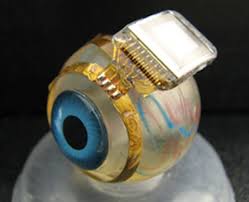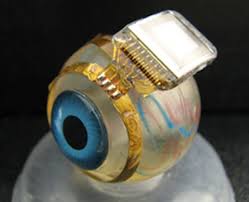
Funding for more testing of Argus II, otherwise known as the 'bionic eye', would be provided by the National Health Scheme (NHS), the British agency has recently announced.
NHS (National Health Service) England said very recently that surgery that will see an implant placed in their retina will be given to ten patients with Retinitis Pigmentosa (RP). RP is an eye disease that is most often inherited and which results in blindness.
The functioning of the 'bionic eye' depends on detection and decoding of wireless signals, which are captured and sent by a camera on a pair of glasses through nerves that control sight, by patients' brains as flashes of light.
U.S. based Second Sight Medical Products is behind the Argus II system.
Manchester Eye Hospital and London's Moorfields Eye Hospital is the place where the operations would take place sometime in 2017.
There has been significant impact of the system for the patients who are already using it. After being blind for as long as 25 years, Keith Hayman, 68, was one of three people fitted with the Argus II during a trial.
"Having spent half my life in darkness, I can now tell when my grandchildren run towards me and make out lights twinkling on Christmas trees," he said in a statement at the time of the announcement for the funding.
"I would be talking to a friend who might have walked off and I couldn't tell and kept talking to myself," he added. "This doesn't happen anymore, because I can tell when they have gone. These little things make all the difference to me."
Hayman's surgery was performed by Paulo Stanga, who works at the Manchester Royal Eye Hospital.
"I'm delighted that our pioneering research has provided the evidence to support NHS England's decision to fund the bionic eye for the first time for patients," he said in te same statement issued by the government agency.
"It surpassed all of our expectations when we realized that one of the RP patients in Manchester using the bionic eye could identify large letters for the first time in his adult life," he added.
The Commissioning through Evaluation scheme, which has been set up to collect evidence on treatments showing "significant promise for the future", would be the conduit for the funding of the testing, the NHS England said. Patients will also be assessed for one year to see how the Argus II is improving their quality of life after the operation procedures take place.
"This highly innovative NHS-funded procedure shows real promise and could change lives," Jonathan Fielden, director of specialized commissioning and deputy national medical director for NHS England said. "The NHS has given the world medical innovations ranging from modern cataract surgery, new vaccines and hip replacements," he added.
"Now once again the NHS is at the forefront of harnessing ground-breaking science for the benefit patients in this country."
(Source:www.cnbc.com)
NHS (National Health Service) England said very recently that surgery that will see an implant placed in their retina will be given to ten patients with Retinitis Pigmentosa (RP). RP is an eye disease that is most often inherited and which results in blindness.
The functioning of the 'bionic eye' depends on detection and decoding of wireless signals, which are captured and sent by a camera on a pair of glasses through nerves that control sight, by patients' brains as flashes of light.
U.S. based Second Sight Medical Products is behind the Argus II system.
Manchester Eye Hospital and London's Moorfields Eye Hospital is the place where the operations would take place sometime in 2017.
There has been significant impact of the system for the patients who are already using it. After being blind for as long as 25 years, Keith Hayman, 68, was one of three people fitted with the Argus II during a trial.
"Having spent half my life in darkness, I can now tell when my grandchildren run towards me and make out lights twinkling on Christmas trees," he said in a statement at the time of the announcement for the funding.
"I would be talking to a friend who might have walked off and I couldn't tell and kept talking to myself," he added. "This doesn't happen anymore, because I can tell when they have gone. These little things make all the difference to me."
Hayman's surgery was performed by Paulo Stanga, who works at the Manchester Royal Eye Hospital.
"I'm delighted that our pioneering research has provided the evidence to support NHS England's decision to fund the bionic eye for the first time for patients," he said in te same statement issued by the government agency.
"It surpassed all of our expectations when we realized that one of the RP patients in Manchester using the bionic eye could identify large letters for the first time in his adult life," he added.
The Commissioning through Evaluation scheme, which has been set up to collect evidence on treatments showing "significant promise for the future", would be the conduit for the funding of the testing, the NHS England said. Patients will also be assessed for one year to see how the Argus II is improving their quality of life after the operation procedures take place.
"This highly innovative NHS-funded procedure shows real promise and could change lives," Jonathan Fielden, director of specialized commissioning and deputy national medical director for NHS England said. "The NHS has given the world medical innovations ranging from modern cataract surgery, new vaccines and hip replacements," he added.
"Now once again the NHS is at the forefront of harnessing ground-breaking science for the benefit patients in this country."
(Source:www.cnbc.com)














